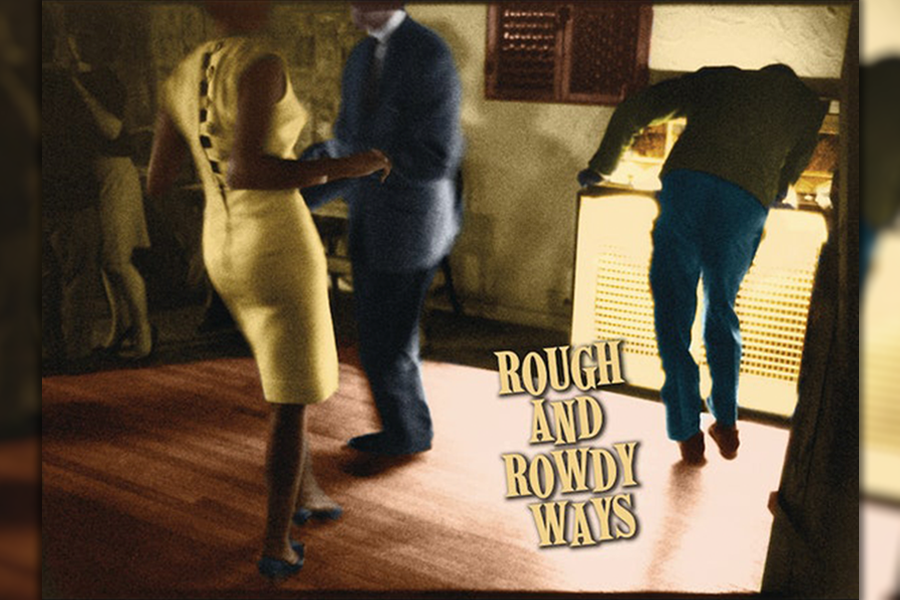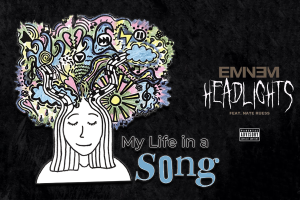In ‘Rough and Rowdy Ways,’ Bob Dylan looks back to see the present
RETROSPECT: In his 39th studio album, Dylan uses historical themes to show where we are now.
March 19, 2021
Even after a nearly 60-year career of songs covering everything from love to race to politics to death and so much more, Bob Dylan does not fail to deliver a simultaneously timely and timeless collection of songs in his 39th album, and his first in eight years to contain all original work.
Rough and Rowdy Ways, which came out last June 19, comes in at 70 minutes of songs ranging from a Frankenstein-themed “My Own Version of You” to a tribute to an American blues musician in “Goodbye Jimmy Reed.”
In this album, Dylan seems to take the role of a historian, talking of stories from not just his own life, but also American culture as a whole. This comes through in many songs, but perhaps best of all in “Murder Most Foul,” his longest song to date.
It is 16 minutes and 55 seconds long, with lyrics that retell John F. Kennedy’s assassination with pop culture references from that time, referencing songs such as “Dizzy Miss Lizzy” by Larry Williams. The last section of the song is essentially listing songs of the period, for example:
“Misty” for me and “That Old Devil Moon”
Play “Anything Goes” and “Memphis in June”
Musically, “Murder Most Foul” isn’t complicated; it is mostly played over two chords, with a melody that is almost entirely one note. Piano (played by Fiona Apple), a single violin and simple percussion seem to serve as a backing track for poetry rather than a song meant to be sung. That isn’t to say the song’s backing is unnoteworthy; in fact, its free-form simplicity ironically helps add complexity and depth to what Dylan is saying.
Although at its center the song is about JFK’s murder, the song feels as though it is speaking on not just JFK, but on the COVID pandemic as well. Originally released as a single in late March of 2020, what “Murder Most Foul” is really trying to get at is how in time of calamity, America can fall back on music.
Also noteworthy on the album is its opening track, “I Contain Multitudes” – a nod to Walt Whitman – that opens with electric guitar, apparently played by Blake Mills, who is identified as playing in other tracks on the album. The song sets the tone for Dylan musing for himself and his life, making it a perfect precursor for what’s to come in the album. The song is about how Dylan feels about his own multiplicity:
Today and tomorrow, and yesterday, too
The flowers are dyin’ like all things do
Follow me close, I’m going to Balian Bali
I’ll lose my mind if you don’t come with me
I fuss with my hair, and I fight blood feuds
I contain multitudes
Not everyone will love this album. As has been for Dylan’s entire career, Bob Dylan’s vocal sound is not for everybody. The nasally voice of his youth has become even more throaty and rough because of his age and perhaps a long life of smoking. Although some find his way of singing evocatively natural, this can be a turn-off for others, perhaps even more now than in the past.
And, there are no acoustic folk songs at all, even though it’s an album that looks back and acoustic folk music is where he got his start, such as in early albums such as Freewheelin’ Bob Dylan and The Times They Are A Changin’. Dylan hasn’t released a fully acoustic folk album since his World Gone Wrong in 1993.
Also absent, as in his other more recent albums, is what has come to be Dylan’s trademark instrument, the harmonica. The lack of harmonica won’t be noticed by most, however it may come as a surprise to some who haven’t kept up with Dylan’s later work.
Overall, the album speaks more than anything else of one thing: reflection. From the music to the lyrics, the ambience of the album all surrounds that one theme. The album may surprise some, as many artists tend to drop off in quality in their later years, but Dylan does not. Rather, he’s taken his age in stride. In Rough and Rowdy Ways, Bob Dylan has used his experiences and what he’s picked up from throughout his life to make an album that feels as though he is trying to use the past to write about the future.















